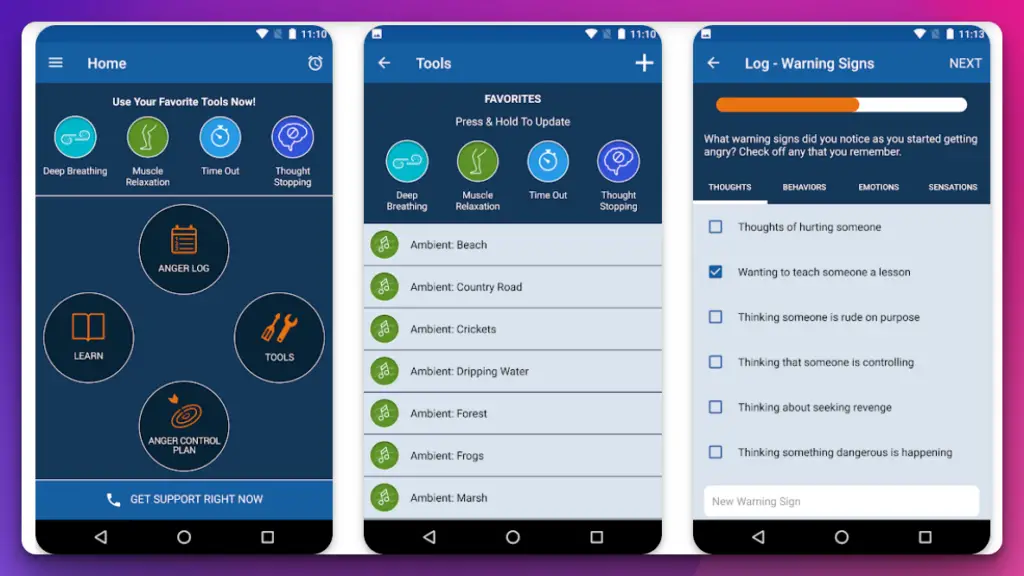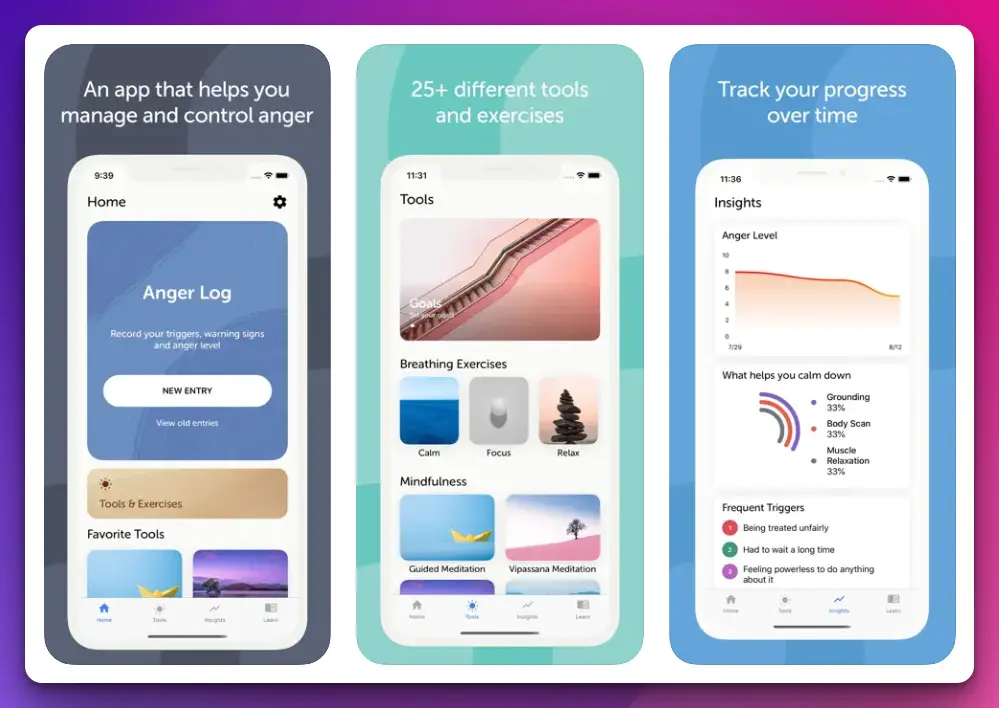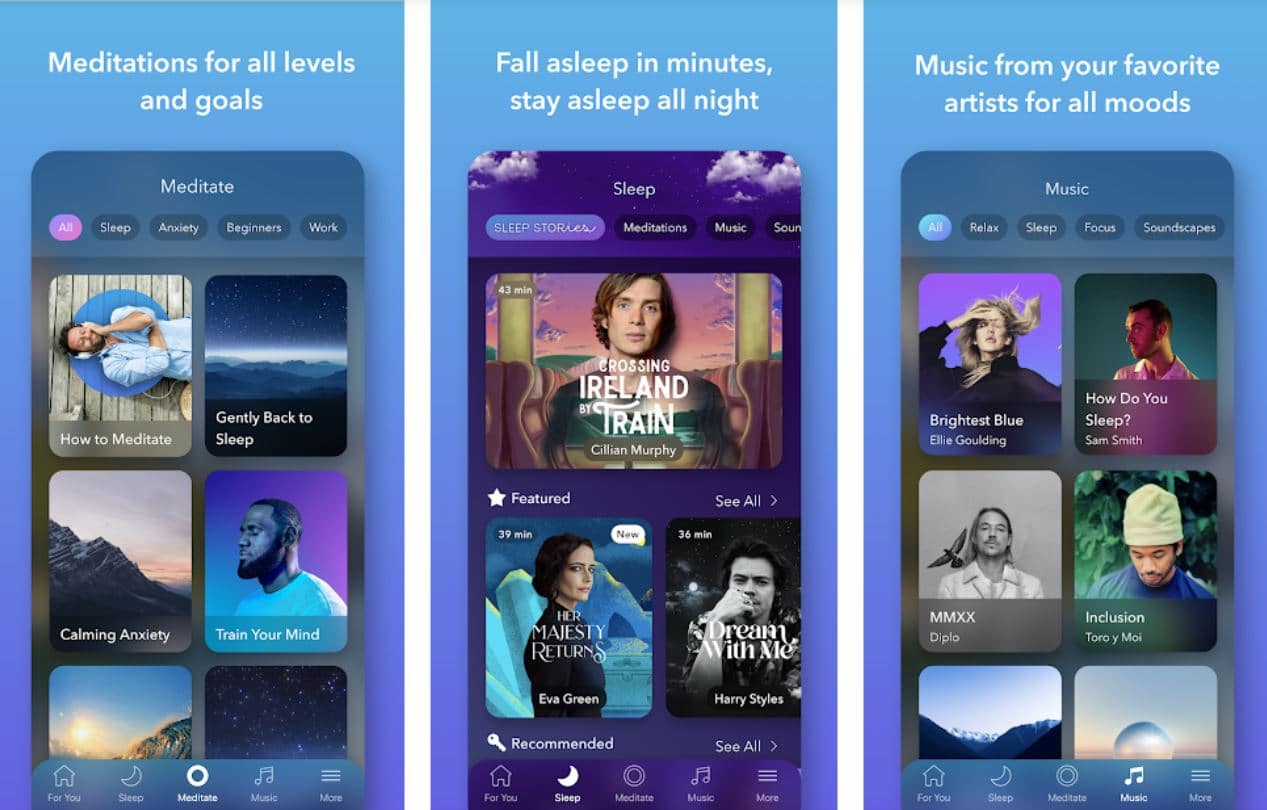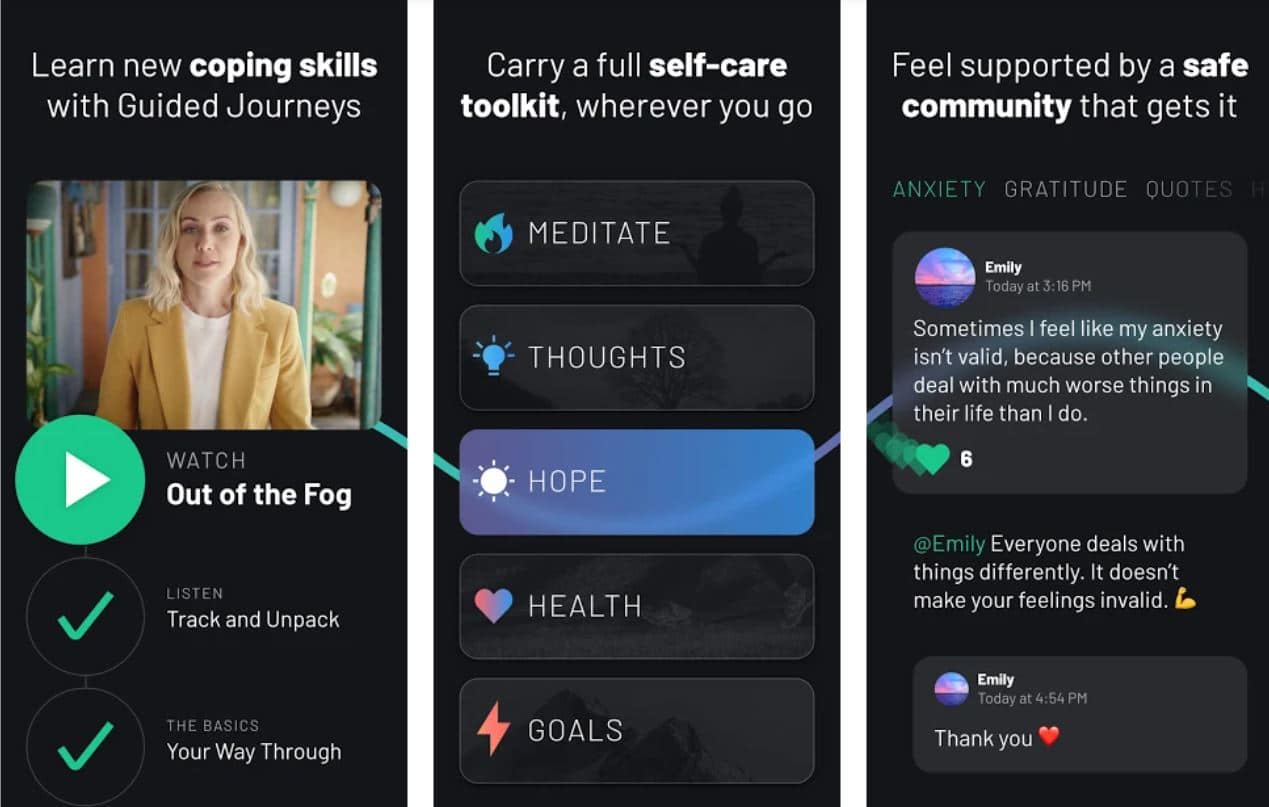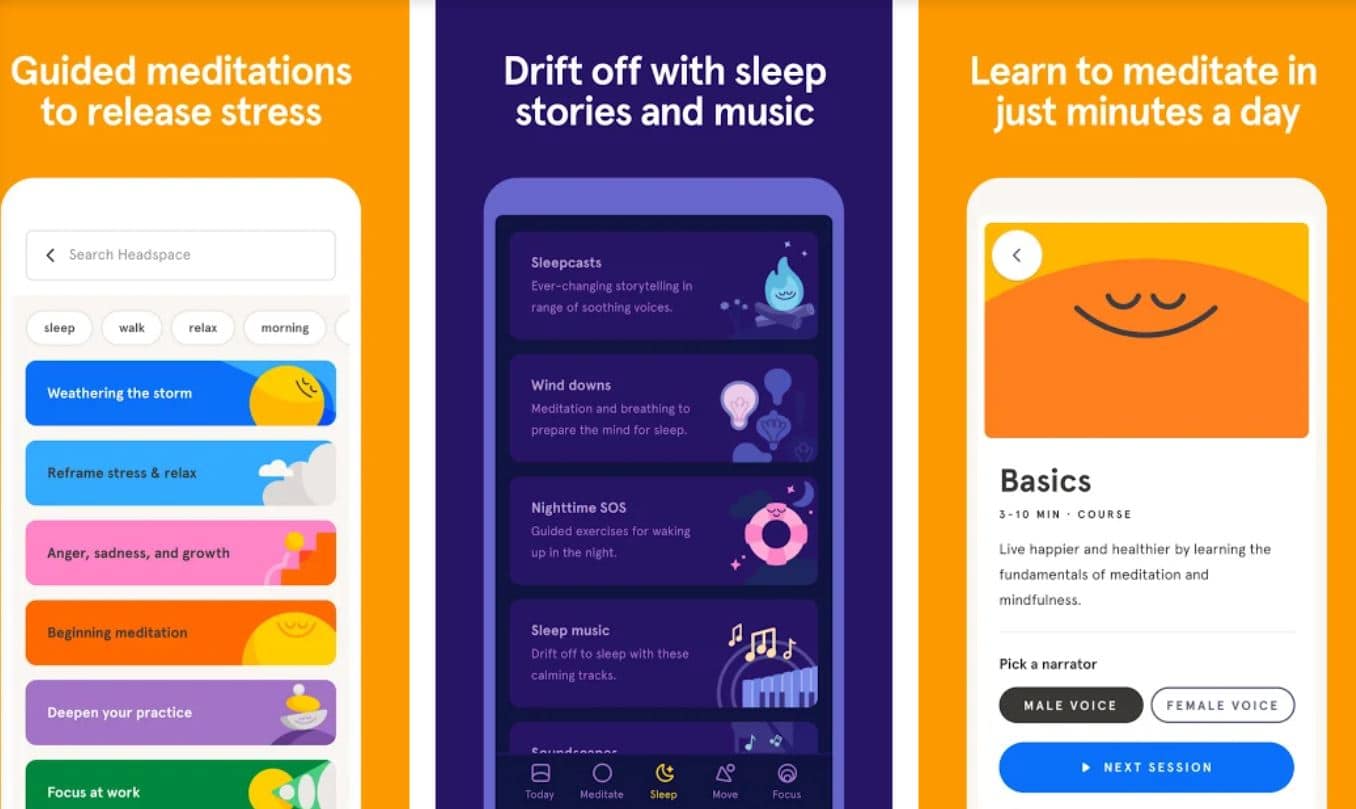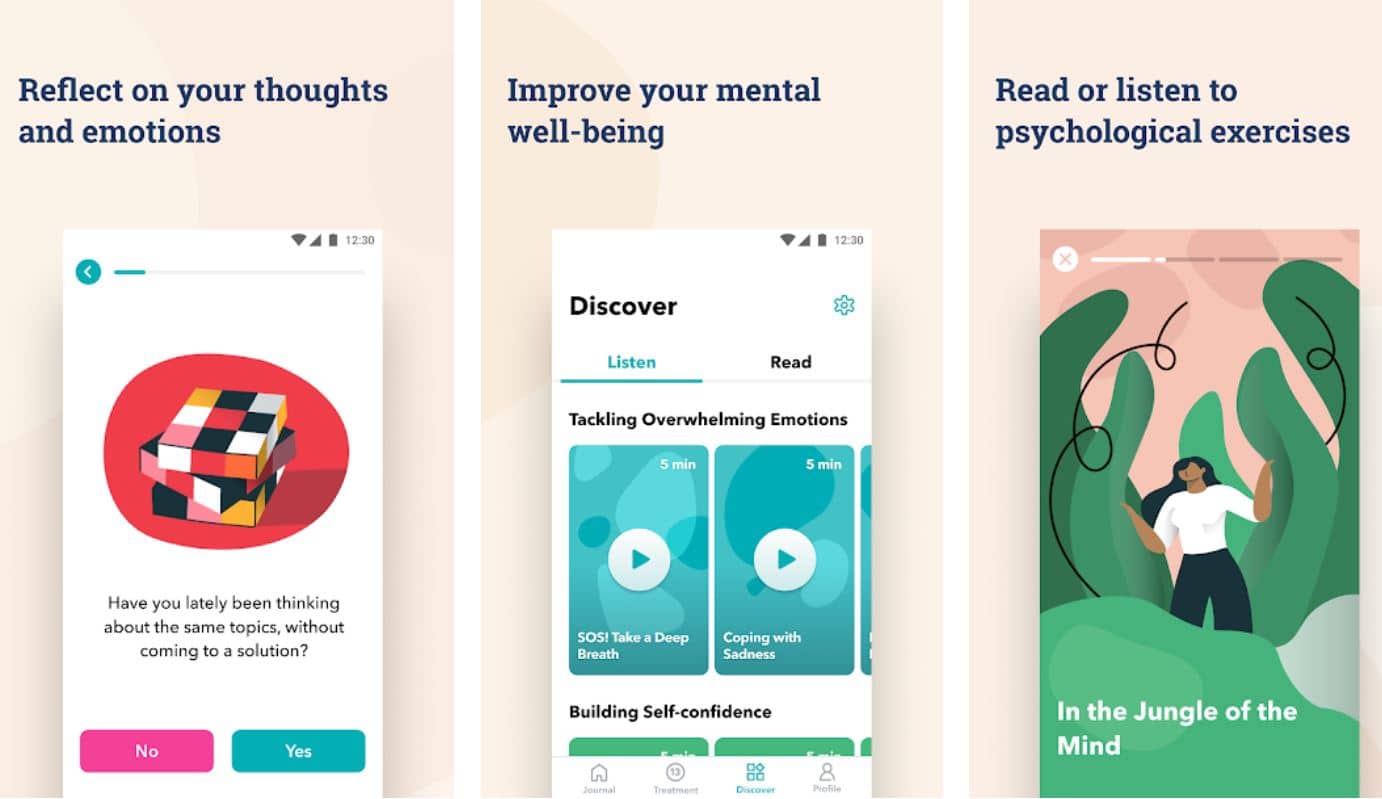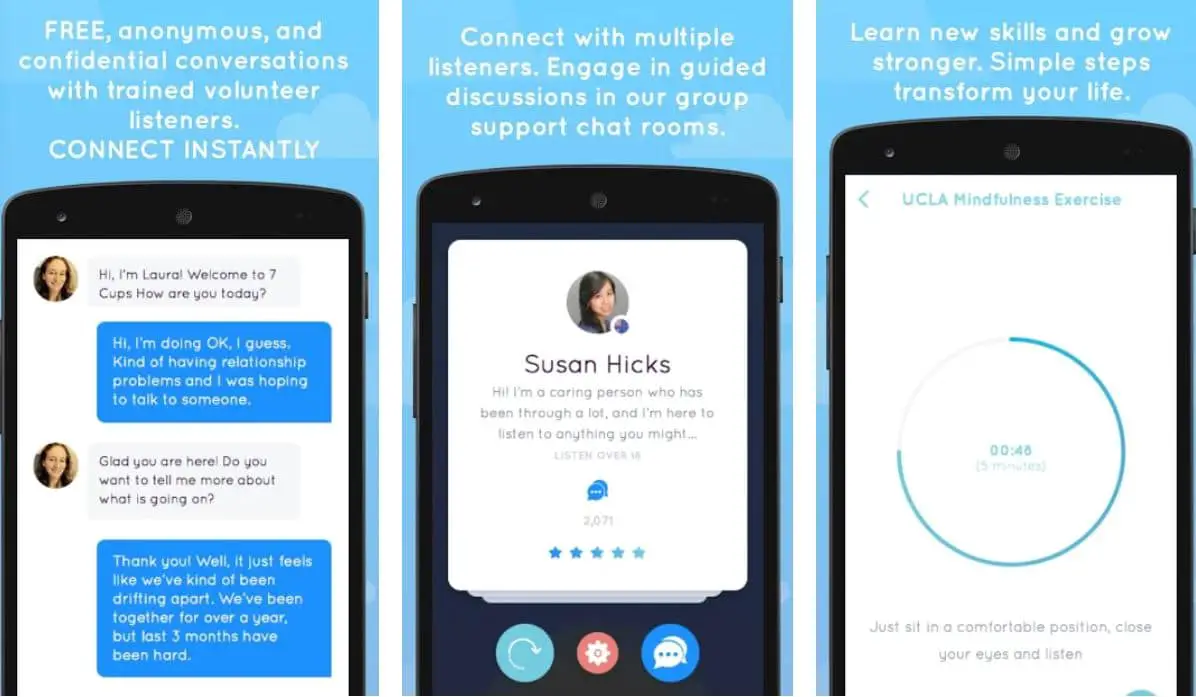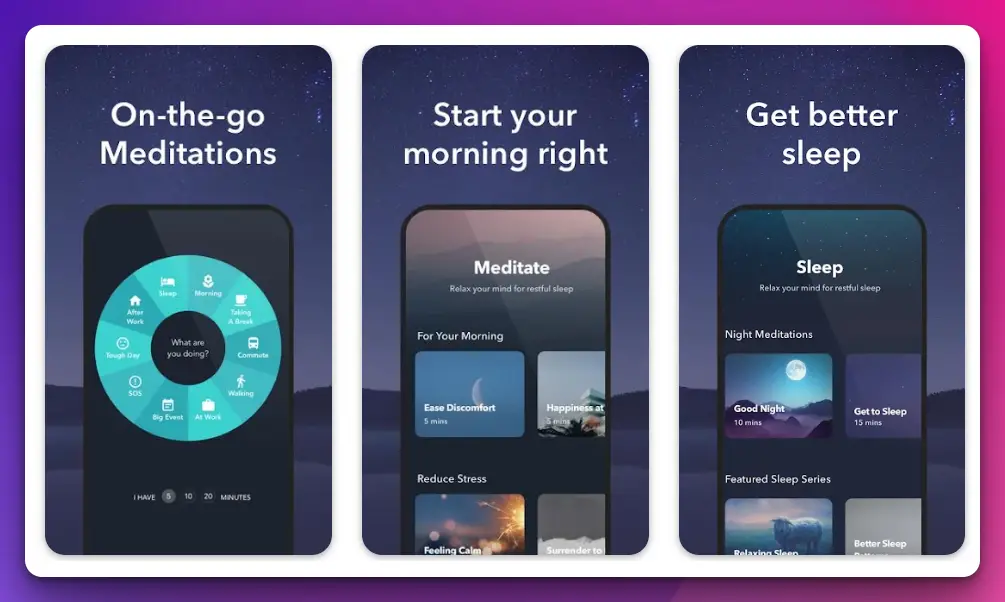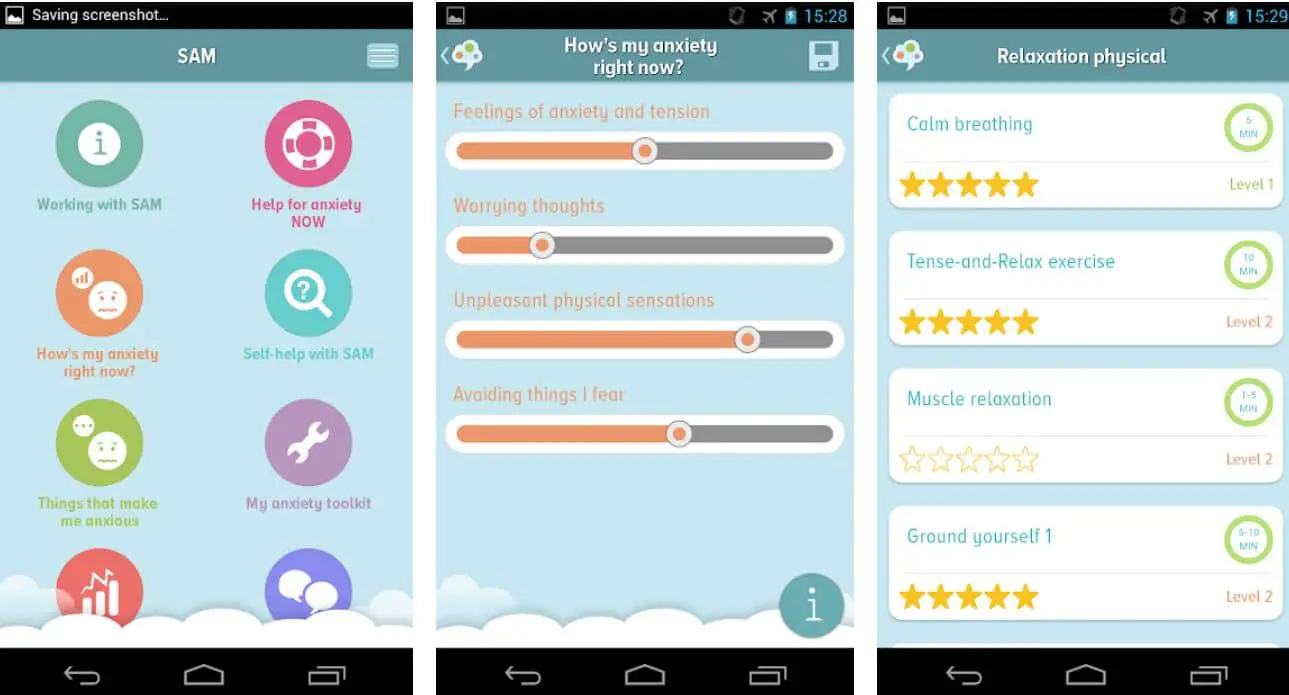Are you tired of feeling overwhelmed by anger? Do you find maintaining control over your emotions in intense situations challenging?💁
If so, you’re not alone. Anger is a natural and powerful emotion that can harm your relationships, health, and overall well-being when left unmanaged.
The good news is that in today’s digital age, there’s an innovative solution right at your fingertips: anger management apps.
In this article, we’ll delve into the world of anger management apps and explore how they can revolutionize the way you handle anger.
Whether seeking immediate relief during heated moments or long-term strategies to address underlying triggers, these apps offer a comprehensive toolkit for emotional growth and self-improvement.
We’ll guide you through these apps’ benefits, features, and effectiveness, enabling you to take charge of your anger and live a more balanced, harmonious life.
Are you ready to embrace a transformative journey toward better anger management?🦄
Let’s dive in and discover the power of anger management apps, empowering you to harness your emotions and unlock a greater sense of peace and well-being.
Understanding Anger Management Apps
Anger management is essential to maintaining emotional well-being in today’s fast-paced world.
With the rise of technology, anger management apps have emerged as valuable tools to assist individuals in recognizing, understanding, and effectively managing their anger.
These innovative applications provide a range of features and functionalities to support users on their journey toward emotional self-regulation.
These apps offer a comprehensive self-assessment feature that allows users to gain insights into their anger’s root causes and triggers.
Individuals can develop strategies to address their anger more effectively by providing a deeper understanding of one’s emotions.
Furthermore, these apps present many techniques for managing anger and stress. From cognitive restructuring to mindfulness exercises, users are equipped with diverse tools to alleviate and control their anger responses.
Anger management apps incorporate breathing exercises and meditative activities to promote relaxation and emotional balance. These practices help individuals ground themselves in the present moment, fostering a sense of calm and clarity.
Additionally, users can leverage the journaling feature within these apps to document their emotional experiences and track their progress over time.
This reflective process empowers individuals to identify patterns and adjust their anger management strategies.
The communication tools integrated into anger management apps enable users to connect with support networks and seek professional guidance.
Whether through online communities or direct messaging, individuals can share their experiences, seek advice, and receive encouragement from others who understand their struggles.
While anger management apps offer significant benefits, it’s important to recognize their limitations. These apps should be viewed as complementary tools rather than substitutes for professional therapy.
In cases where anger issues are severe or deeply rooted, seeking guidance from a licensed therapist or counselor remains crucial for comprehensive treatment.
In conclusion, anger management apps have revolutionized how individuals address their anger and regulate their emotions.
With their diverse features, from self-assessment tools to mindfulness exercises, these apps empower individuals to understand their anger better and develop effective strategies for emotional well-being.
By embracing technology as a partner in managing anger, individuals can embark on a transformative journey towards healthier emotional expression and improved overall mental health.
Best Anger Management Apps To Find Inner Peace
1. AIMS for Anger Management
When it comes to managing anger, modern technology has introduced a new ally in the form of AIMS for Anger Management.
This cutting-edge anger management app leverages advanced techniques to facilitate emotional transformation.
Designed to address the complexities of anger, this app goes beyond conventional approaches, offering a comprehensive and personalized solution for individuals seeking to regain control over their emotions.
AIMS, which stands for Awareness, Insight, Mindfulness, and Support, embodies the core principles of this revolutionary anger management app.
By integrating these elements, the app provides users with a powerful toolkit to navigate the intricate landscape of anger and promote lasting change.
With Awareness as its foundation, AIMS helps individuals gain a deep understanding of their anger triggers, patterns, and underlying emotions.
Through interactive exercises and self-reflection prompts, users develop a heightened sense of self-awareness, identifying the root causes of their anger and laying the groundwork for transformation.
Insight, the next pillar of AIMS, empowers users with a profound understanding of their anger dynamics.
Utilizing sophisticated algorithms and behavioral analysis, the app offers personalized insights and recommendations, unveiling hidden patterns and suggesting tailored strategies for emotional regulation.
Mindfulness, an integral component of AIMS, fosters a present-moment awareness that helps individuals detach from their anger and observe it with clarity and non-judgment.
Through guided meditations, breathing exercises, and grounding techniques, users cultivate a calm and centered state of mind, enabling them to respond to triggers more constructively.
Finally, AIMS recognizes the importance of Support in the journey toward anger management. The app provides a safe and nurturing space, connecting users with like-minded communities and professional support networks.
Through peer interactions, expert guidance, and virtual support groups, individuals find solace, encouragement, and inspiration, bolstering their commitment to change.
Download the App from Google Play Store
Download the App from Apple App Store
2. Quit Anger: Anger Management
In the realm of anger management, a groundbreaking solution has emerged: Quit Anger, an innovative anger management app designed to revolutionize emotional well-being.
This cutting-edge app embraces a holistic approach, empowering users to navigate the intricate landscape of anger through effective strategies and comprehensive tools.
Quit Anger serves as a digital companion, guiding individuals towards emotional transformation.
This app recognizes that anger is a complex emotion influenced by various factors and aims to provide users with the necessary resources to understand and manage their anger effectively.
Individuals embark on a transformative journey toward self-awareness and emotional regulation with Quit Anger.
The app integrates evidence-based techniques, such as cognitive restructuring and mindfulness exercises, to help users gain a deep understanding of their anger triggers and develop healthier coping mechanisms.
Quit Anger’s user-friendly interface allows individuals to track their anger patterns, record their emotional responses, and identify recurring themes.
Through data analysis and personalized insights, users gain valuable knowledge about their anger dynamics, facilitating a proactive approach to managing their emotions.
Additionally, Quit Anger offers a range of practical tools and resources, including guided meditations, breathing exercises, and journaling prompts.
These exercises foster self-reflection and emotional release, enabling individuals to process their anger constructively.
Furthermore, Quit Anger provides a supportive community where users can connect with like-minded individuals and share their experiences.
Engaging in discussions, seeking advice, and receiving peer encouragement create a sense of belonging and reinforce the commitment to anger management.
In conclusion, Quit Anger stands out as an exceptional anger management app, empowering individuals to embark on a transformative journey toward emotional well-being.
With its comprehensive toolkit, personalized insights, and supportive community, Quit Anger equips users with the tools they need to navigate the complexities of anger and develop healthier, more constructive responses.
Don’t let anger control your life—take control with Quit Anger and embrace a calmer, more balanced existence.
Download the App From Apple App Store
3. Calm – Editor Choice Anger Management App 🤴
Calm is an app millions trust for help regarding sleeping, meditation, and relaxation.
The app features various step-by-step meditations for managing stress, anxiety, and anger. Users can set customized timers for most of the meditations listed on the Calm app.
Some of the most reliable and effective meditation programs include Deep Sleep, Focus and Concentration, Calming Anxiety, and more.
Each meditation program is customized for users in various stages of life. The app also has guided meditation for college students with mindfulness college.
Apart from these guided meditations, the app also features stories to help users fall asleep. Users can choose the length of the program anywhere between 7 days and 21 days. The app also sends reminders to help users continue their routines.
Users can choose between beginner, intermediate, and expert levels as per one’s familiarity with meditation. The app will then suggest programs based on the user’s response.
Pros of Calm App:-
1. The app includes masterclass sessions from expert psychologists and other professionals. The masterclasses are available for various topics and can help users improve themself in various fields. Users can also download masterclasses for offline use.
2. Users can also listen to music from their favorite artists using the Calm app. It gives users the ability to explore new songs based on their moods.
3. Kids and teenagers can also use the calm app to manage their anger, anxiety, and stress.
4. To help users build great habits and take total control of their emotions, the Calm app also allows them to track their progress.
5. Users can do various breathing exercises regularly to get rid of their anger issues.
Cons of Calm App:-
1. Some of the content on the app requires users to have a subscription.
2. Sometimes, the app might misbehave and send notifications and reminders at frequent intervals.
3. The premium content charges might be beyond some users’ budgets.
4. Sanvello for Anxiety, Depression, and Stress
Sanvello is a power-packed app for stressed, anxious, and depressed people. The app features therapy sessions, coaching, and self-care tools to help users deal with their anger or anxiety.
Sanvello works using Cognitive Behaviour Therapy to manage the problems of the users.
Cognitive Behaviour Therapy can help experts deal with their patients’ stress, anxiety, and anger. The Sanvello app combines CBT and technology to help its users.
As per data from the app, 60 percent of the users felt a change in their overall mental health.
The app also has a community of around 3 million users. Sanvello’s community allows users to indulge in active discussions and group chats on various issues.
The significant part is that Sanvello keeps the user identity as Anonymous during the group discussions.
The user interface of the Sanvello app is beautifully designed, and the theme is so relaxing. One may use the app to instantly control their anger and protect their relationships from the adverse effects of anger.
On the other hand, the community interactions are warming, and most members are generous. Sanvello’s community makes the app stand out as one of the most promising.
Pros:-
1. The techniques provided in the app are clinically proven and tested. The self-care tools are carefully crafted to ensure users can cope with their emotions.
2. Users can practice mindfulness with a variety of guided meditations. The activity tracker can help users check their progress regularly.
3. The live interactive therapy sessions are great for users who struggle to share their emotions with friends and family.
4. One can also improve public speaking skills with some of the activities mentioned in the app.
Cons:-
1. Some of the features in the Sanvello app might not work for users outside the United States. Even features like Therapy are available in select US states.
2. Sometimes, users may face issues using their Gmail to create an account on Sanvello App.
5. HeadSpace
Head Space is one of the most trusted anger management apps, with over ten million users. With meditation, users can create better habits and control their emotions to lead a better life.
The HeadSpace app guides users with step-by-step meditation practices and helps them focus and stay calm.
Regular breathing practices for about ten to twenty minutes can change one’s outlook on life and mental health.
Head Space is home to various calming, effective, and simple meditative programs and practices. One would feel better, lighter, and more confident after doing the suggested exercises carefully.
Users who find it difficult to fall asleep may also use the HeadSpace app to get help with sleeping. There are numerous meditations for users struggling with poor sleeping patterns. The app also has a collection of soothing sounds to help users sleep better.
Users can also motivate their friends or family by sharing their daily progress. The progress tracker of Headspace is an excellent tool for users to stay motivated.
To help beginners meditate better, the app’s co-founder provides tips to the users as their coach.
Pros of Head Space:-
1. As the app has many meditation programs for all age groups, even kids can use it for mindfulness. Programs are focusing on kids to help them focus better and sleep well.
2. The app also includes various breathing exercises for a calming experience during a tough day.
3. The co-founder’s support for newbies to get started on mindfulness is a great way to motivate people.
4. Users can also avail of SOS sessions with experts from Head Space. SOS Sessions intend to provide relief to the users during their emotional breakdowns.
Cons of Head Space:-
1. Plenty of helpful features are only available to users with a monthly subscription.
2. Some issues might struggle while creating a new account on the app. However, the technical team seems promising to resolve such problems soon.
6. MindDoc: Mood Tracker for Depression & Anxiety
MindDoc is a journal for people who have anger or anxiety issues. One can record their feelings in the journal, which tracks how a user feels.
Once a user’s answers are analyzed, the MindDoc suggests various exercises users can perform to improve their situation.
MindDoc can be great for curing mild symptoms of anxiety, depression, and low self-esteem. The reports of the Mind Doc app can be shared with professional therapists or Psychologists.
Users can also use the journal to explain how they feel at a point in time.
The MindDoc journal gives important insights into one’s behavior and emotions. These insights can help users better understand themselves and control their emotions.
The audio and visual exercises suggested in the app for the users have a soothing and relaxing impact on most issues.
The user interface of the MindDoc app is clean and doesn’t confuse users with complex processes. Features like Discover the app is helpful for users to explore more exercises and therapies on the app.
Pros of Mind Doc:-
1. Scientists and psychotherapists design the MindDoc app. The app tries to create awareness about mental health and provide instant help for mild symptoms.
2. Since psychotherapists and scientists designed it, the programs suggested by the app are powerful, effective, and trustworthy.
3. The monitoring feature of the MindDoc journal is impressive and works efficiently to detect symptoms.
4. The insights generated by the app can help users understand what triggers their mental health. The insights also include mindful practices that can help users stay calm.
Cons of MindDoc:-
1. Some features of the MindDoc app are locked. Users need to spend their money to unlock the app’s full potential.
2. Kids might be unable to improve their mental health with the help of the Mind Doc app.
7. BetterHelp
Over a million users have control of their anxiety, anger, or depression with the BetterHelp app. The app has over 10,000 trained experts eager to help users with anxiety or depression issues.
Experts on the BetterHelp app can also provide users CBT and DBT therapy. Not many apps provide Dialectical Behavioral Therapy, and BetterHelp experts are a blessing.
One may use BetterHelp, one of the most trusted apps, to get experts’ help for their Stress, Anxiety, OCD, and more. Users may also choose to have live interactive therapy sessions with the experts.
There’s no limit on how many sessions a user may have with their therapist on the BetterHelp app. Moreover, the user and the therapist keep all the sessions secret.
Pros of BetterHelp:-
1. Users can effortlessly get help for their mental health from expert therapists and counselors. Moreover, users don’t need to visit a clinic to talk to a mental health expert.
2. The app aims to help with mental health issues like Obsessive Compulsive Disorder, Anger, Stress, and Social Anxiety.
3. Experts provide customized suggestions for each user.
4. BetterHelp app also conducts web seminars to help users understand more about mental health. These webinars are conducted to educate more and more users about mental health.
Cons of BetterHelp:-
1. The app lacks features like guided meditations to help users soothe their anxiety or stress.
2. People who hesitate to communicate on video calls might not be able to use the app to its full potential.
8. 7 Cups: Anxiety & Stress Chat
7 Cups is another one of the most trusted and reliable apps. Users can take help with their mental health issues like anger, depression, stress, and anxiety.
The app features a variety of tools for mindfulness and the user’s overall well-being. The app claims to provide free mental health solutions. However, some features are locked and require users to pay for them.
The 7 Cups app has trained listeners who work with the users and understand their condition. Once the listener has all the information about the user’s condition, they recommend various exercises and mindfulness meditations.
All the experts on the app are either trained listeners or licensed therapists. The users can be sure they’ll get professional help when using the 7 Cups app. Users can be worry-free as the app ensures full protection of the user data.
Pros of 7 Cups:-
1. Users can choose the listener they want to talk with and share their experiences. This feature lets users take control and only talk with users they feel would be good enough.
2. 7 Cups users can also hide their identity and stay anonymous with the listeners. This feature comes in handy for shy people.
3. Speaking to a listener on the 7 Cups app is free.
4. Users who decide to text their listeners can also do so without fearing that the app stores their data. All the chats are deleted to ensure data protection.
Cons of 7 Cups:-
1. Users wishing to speak to therapists might need to spend money on therapy.
2. The app’s graphics could have been better and more relaxing.
9. Simple Habit
People with anger issues often feel anxious or do something that might ruin things for them.
Users can find numerous guided meditations and therapy sessions for fighting depression and anxiety. The coaches on the Simple Habit app are former monks and renowned experts in mental health.
The experience and expertise of the experts can help users relax and feel less anxious. Users can customize their meditation plans for anywhere between five to twenty minutes.
If users feel demotivated or emotionally drained, they can also get motivation sessions from the experts. There’s a lot of coaching staff available on the Simple Habit app.
The app also features mental health experts podcasts, making it stand out from most other apps.
With the app’s interactive user interface, users can also track their progress toward better mental health. The app can help users create great habits to change their lives.
Pros of Simple Habit:-
1. Users of the Simple Habit app can also develop effective leadership skills with various leadership programs included in the app.
2. Regular use of the simple habit app can lead to better mental health and healthier intra-personal relationships.
3. One can always stay positive with the help of various exercises in the Simple Habit app.
4. The Simple Habit app is easy to use.
Cons of Simple Habit:-
1. Some of the most effective features of the app are locked. And the users need to pay EFI to unlock them.
2. Some meditations included in the app might play automatically and may annoy the users.
10. Self Help For Anxiety Management
Anxiety Management is crucial to avoiding negative emotions and feelings. People often struggle with anxiety, stress, and depression.
To help students, professionals, and couples cope with anxiety, the University of West England designed the SAM app.
SAM or Self Help for Anxiety Management, is among those anger management apps that reflect the user’s mental health issues. The app can trace what triggers the user and makes them anxious, stressed, or angry.
Various techniques are listed on the SAM app to help users deal with mild stress or anger. One may use the app to develop their mental health knowledge and deal with stress.
The SAM app is created by professional psychologists and trained experts keen to help others improve their mental health. Moreover, the app is easy to use with a great user interface.
Pros of Self-Help for Anxiety Management:-
1. Professional psychologists create the Self Help for Anxiety App. One can be assured that they will get the best help.
2. Users can also share their stories and experiences with other users on the app. The experience sharing can be done while staying anonymous.
3. Users also get guidance from top experts on how they can practice self-help to tackle mental health issues.
4. The app is user-friendly.
Cons of Self-Help for Anxiety Management:-
1. Users cannot find guided meditations to manage their anger.
2. Teenagers and kids might struggle to understand and manage their mental health issues using the SAM app.
Key Features of Anger Management Apps
When managing anger effectively, the role of anger management apps cannot be underestimated.
These innovative applications offer a range of key features designed to empower individuals in their journey toward emotional self-regulation.
One of the fundamental aspects of anger management apps is their self-assessment tools. These tools allow users to delve deep into their emotions, helping them identify the underlying causes and triggers of their anger.
By gaining insight into the root of their anger, individuals can better understand their emotional landscape.
These apps provide various techniques to support individuals in managing their anger and stress levels.
These include cognitive restructuring, which helps individuals reframe their thoughts and perceptions, and mindfulness exercises, which promote present-moment awareness and emotional balance.
These techniques empower users to shift their mindset and constructively respond to anger.
Anger management apps also incorporate breathing exercises and meditative activities to promote relaxation and calmness.
By focusing on deep breathing and engaging in mindfulness practices, individuals can reduce the intensity of their anger and cultivate a sense of inner peace.
Keeping track of one’s progress is essential in anger management, and these apps offer journaling features for that purpose.
Users can document their emotional experiences, track patterns, and monitor their growth over time.
This self-reflection enhances self-awareness and aids in developing effective anger management strategies.
Moreover, these apps provide communication tools that facilitate connections with support networks.
Online communities, chat platforms, and access to professional guidance allow individuals to share experiences, seek advice, and receive encouragement from others who understand their struggles.
In conclusion, the key features offered by anger management apps, including self-assessment tools, various techniques, breathing exercises, journaling features, and communication tools, make them valuable resources in the pursuit of emotional well-being.
By leveraging these features, individuals can gain insight into their anger, develop healthy coping mechanisms, and foster positive life changes.
Advantages and Disadvantages of Anger Management Apps
In the digital age, anger management apps have emerged as powerful tools for individuals seeking support in controlling their anger.
These apps offer several advantages that contribute to their effectiveness.
One of the significant advantages is convenience. Anger management apps allow users to access resources and tools at their own pace and convenience, anytime and anywhere.
This accessibility allows individuals to work on their anger management skills in a manner that fits their busy lifestyles.
Another advantage is privacy and anonymity. Many people feel more comfortable exploring and addressing their anger-related issues privately.
Anger management apps provide a safe and secure platform for users to engage with resources and seek support without disclosing their identity or personal information.
Moreover, these apps are cost-effective compared to traditional therapy. While professional counseling can be expensive, anger management apps often offer affordable or free access to various valuable tools and techniques.
One notable advantage of these apps is their customization and personalization. They often incorporate tailored exercises and strategies based on the user’s specific needs and goals.
This individualized approach enhances the effectiveness of anger management interventions and promotes better outcomes.
However, it is important to acknowledge the disadvantages and limitations of anger management apps. One major drawback is the lack of personalized guidance.
While these apps can provide general techniques and information, they cannot replace the expertise and tailored support a qualified professional can offer.
Additionally, relying solely on anger management apps without seeking professional help may not address the root causes of deep-seated anger issues.
It is essential to recognize when the assistance of a licensed therapist or counselor is necessary for comprehensive and long-term treatment.
Lastly, there is a potential risk of over-reliance on technology. While anger management apps can be effective tools, individuals should be cautious not to become overly dependent on them.
Building strong interpersonal skills and seeking support from trusted individuals offline remains vital for sustainable anger management.
In conclusion, anger management apps provide numerous advantages, such as convenience, privacy, cost-effectiveness, and customization.
However, it is important to be aware of their limitations, including the lack of personalized guidance and the potential for over-reliance.
Individuals can effectively manage their anger and work towards emotional well-being by considering these factors and utilizing anger management apps as part of a holistic approach.
Tips for Choosing and Using Anger Management Apps
When selecting and utilizing anger management apps, it’s essential to consider a few tips to ensure an effective and beneficial experience.
These tips can guide individuals in making informed decisions and maximizing the benefits of these innovative tools.
Assess your specific needs and goals:- Before choosing an anger management app, reflect on your personal requirements and objectives.
Determine whether you prefer guided exercises, self-assessment tools, or communication features. Understanding your needs will help you find an app that aligns with your goals.
Read app reviews and user feedback:- Research is crucial when selecting an anger management app. Read reviews and testimonials from other users to gain insights into their experiences.
Look for apps with positive ratings, constructive feedback, and endorsements from reputable sources.
Evaluate credibility and security:- Ensure that the app you choose is from a reliable source. Check for information about the developers, their qualifications, and any certifications they may have. Additionally, prioritize apps that prioritize user privacy and data security.
Set realistic expectations and combine strategies:- Understand that anger management apps are not a cure-all solution.
While they can be valuable tools, they work best when combined with other strategies such as therapy, self-reflection, and support from trusted individuals. Set realistic expectations and be open to exploring different approaches.
Seek professional help when necessary:- Recognize the limitations of anger management apps. If your anger issues are severe, long-standing, or deeply rooted, consider seeking guidance from a licensed therapist or counselor.
A professional can provide personalized support and guidance tailored to your specific needs.
Anger Management Techniques
In the intricate realm of emotions, anger can be a potent force that requires skillful navigation.
Fortunately, with the right anger management techniques, individuals can gain mastery over their emotional responses, fostering a sense of equilibrium and healthier relationships.
1. Cognitive Restructuring
One of the fundamental anger management techniques is cognitive restructuring. This approach involves identifying and challenging negative thought patterns that contribute to anger.
Individuals can effectively diffuse their anger by reframing irrational beliefs and replacing them with more rational and balanced perspectives.
2. Emotional Regulation
Emotional regulation techniques empower individuals to manage their anger by recognizing signs of escalating emotions.
These techniques include deep breathing exercises, progressive muscle relaxation, and grounding techniques. Individuals can consciously regulate their emotions to prevent anger from spiraling out of control.
3. Effective Communication
Communication plays a vital role in managing anger. Learning assertive communication techniques, such as active listening, expressing feelings using “I” statements, and practicing empathy, can help individuals constructively express their needs and concerns, minimizing potential triggers for anger.
4. Stress Management
Stress is often a catalyst for anger. Stress management techniques, such as regular exercise, mindfulness meditation, and hobbies, can reduce overall stress levels and provide individuals with a healthier outlet for their emotions.
5. Conflict Resolution
Conflict is an inevitable part of human interactions. Learning conflict resolution skills, such as negotiation, compromise, and seeking win-win solutions, can prevent anger from escalating during conflicts, fostering healthier resolutions.
Anger Management Exercises: Enhancing Emotional Well-being
Anger, an intense emotional response, can sometimes become overwhelming, impacting our relationships, health, and overall well-being.
However, we can gain control over this powerful emotion by adopting effective anger management exercises and foster a healthier mindset.
Breathing Techniques:- Deep, diaphragmatic breaths can work wonders in diffusing anger. Inhale slowly through the nose, counting to four, and exhale through pursed lips, counting to six. Repeat this exercise, focusing on the sensation of breath filling and leaving your body.
Progressive Muscle Relaxation:- Tense and release each muscle group, starting from your toes and moving up to your head. Visualize the tension leaving your body with each release, allowing a sense of calmness to permeate your being.
Journaling:- Putting pen to paper enables self-reflection and a deeper understanding of triggers. Write about your anger, exploring its roots, and alternative ways to respond. This practice promotes self-awareness and empowers you to make positive changes.
Physical Exercise:- Engage in activities that release pent-up energy and stimulate endorphin production. Whether it’s jogging, yoga, or boxing, find an exercise that resonates with you, allowing anger to dissipate while promoting a sense of well-being.
Mindfulness Meditation:- Cultivating present-moment awareness helps detach from anger’s grip. Focus on your breath, bodily sensations, and surroundings, acknowledging anger without judgment. This exercise encourages acceptance and emotional balance.
Aims For Anger Management: Unlocking Emotional Equilibrium
Regarding anger management, setting clear aims is essential for achieving lasting emotional equilibrium. These aims serve as guiding beacons, illuminating the path to inner peace and healthy interpersonal relationships.
Let’s delve into the key aims for anger management that can lead you on this transformative journey.
Emotional Awareness:- The first aim is to cultivate a deep understanding of your emotional landscape. By honing your emotional intelligence, you can identify the triggers, patterns, and underlying anger causes. This awareness empowers you to navigate challenging situations with greater composure.
Self-Regulation:- The ability to regulate your emotional responses is paramount. The aim here is to develop effective strategies to manage anger constructively.
Deep breathing, progressive muscle relaxation, and cognitive reframing can help redirect intense emotions and promote self-control.
Communication Skills:- Anger often hampers effective communication, leading to strained relationships. One of the aims for anger management is to enhance your communication skills.
Learning active listening, assertiveness, and conflict resolution techniques can foster healthier interactions, minimizing the escalation of anger.
Stress Management:- Stress can act as a catalyst for anger, exacerbating emotional turmoil. Managing stress through practices like mindfulness, exercise, and self-care is crucial. By addressing stressors proactively, you can create a foundation of calmness that fortifies your resilience against anger triggers.
Conflict Resolution:- Anger and conflicts often go hand in hand. The aim is to develop skills for resolving conflicts peacefully and constructively.
This involves adopting a problem-solving mindset, practicing empathy, and seeking win-win solutions that address the needs of all parties involved.
Best Meditation Apps for Anger Management
Discovering effective tools to manage anger and cultivate emotional balance is crucial for personal well-being.
In today’s digital age, meditation apps have emerged as invaluable resources for individuals seeking to harness their emotions and find inner peace.
Let’s explore some of the best meditation apps for anger management that can transform your relationship with anger.
TranquilSoul:- This app offers a range of guided meditations and mindfulness exercises specifically designed to address anger.
With its soothing voice and serene ambiance, TranquilSoul helps users develop an awareness of their anger triggers and empowers them to respond calmly and clearly.
ZenFlow:- With its innovative approach, ZenFlow combines meditation techniques with biofeedback technology.
The app provides real-time data on the user’s heart rate and stress levels through biofeedback sensors, helping them understand the physiological aspects of anger and guiding them toward relaxation.
MindfulMoment:- MindfulMoment offers a variety of meditation practices that focus on emotional intelligence and self-reflection.
By cultivating self-awareness and compassion, this app equips users with the tools to transform anger into understanding and acceptance.
CalmMind:- CalmMind is renowned for its comprehensive library of meditation sessions, including specialized programs for anger management.
The app offers diverse techniques to calm the mind and release pent-up anger, from breathing exercises to body scans.
InnerBalance: Designed to bring harmony to mind and body, InnerBalance combines meditation practices with heart rate variability (HRV) training.
By promoting coherence between heart rhythms and emotions, this app facilitates a state of emotional equilibrium, reducing the intensity of anger.
Here’s a table highlighting some of the best meditation apps for anger management:-
| App Name | Description | Platforms |
|---|---|---|
| Headspace | Offers guided meditations for stress, anxiety, and anger | iOS, Android |
| Calm | Features guided meditations and breathing exercises | iOS, Android |
| Insight Timer | Provides a wide variety of guided meditations | iOS, Android |
| Stop, Breathe & Think | Focuses on mindfulness and emotional well-being | iOS, Android |
| 10% Happier | Offers meditation courses and sleep meditations | iOS, Android |
| Buddhify | Provides guided meditations for various situations | iOS, Android |
| Smiling Mind | Offers mindfulness exercises for all ages | iOS, Android |
| Simple Habit | Provides short guided meditations for busy individuals | iOS, Android |
| Aura | Features personalized meditation sessions | iOS, Android |
| Oak | Offers breathing exercises and calming meditations | iOS, Android |
✅FAQ’s
Is there an app to help with anger issues?
Several apps are available that can assist with managing anger. Some popular ones include “Anger Management Techniques,” “Calm Harm,” and “Rage Control.”
Here’s a table providing information about apps that can help with anger issues:-
| App Name | Description | Platform | Cost |
|---|---|---|---|
| Calm | Meditation and sleep app with guided meditation sessions to help manage anger and reduce stress. | iOS, Android | Free/Premium |
| Headspace | Provides mindfulness and meditation exercises to assist with anger management and relaxation. | iOS, Android | Free/Premium |
| Talkspace | Online therapy app offering counseling and support for anger management and emotional well-being. | iOS, Android | Subscription |
| MoodMission | A mood-improvement app that offers activities and suggestions to cope with anger and frustration. | iOS, Android | Free |
| Rootd | Designed for managing anxiety, this app offers breathing exercises and visualizations for anger. | iOS, Android | Free/Premium |
| 7 Cups | Connects users with trained listeners for emotional support and chats to manage anger and stress. | iOS, Android | Free/Premium |
| Pacifica | Provides tools for managing stress and anxiety, including anger management techniques. | iOS, Android | Free/Premium |
| What’s Up? | Offers coping strategies, breathing techniques, and tools to manage anger and negative emotions. | iOS, Android | Free |
| SuperBetter | A game-based app that promotes resilience and helps in managing anger and other emotional challenges. | iOS, Android | Free |
| Happify | Science-based activities and games to reduce stress, enhance emotional well-being, and manage anger. | iOS, Android | Free/Premium |
How do I shut my anger off?
To manage anger effectively, it’s important to develop healthy coping mechanisms. Take deep breaths, count to ten, or step away from the situation to give yourself a moment to cool down.
Physical activities like exercise or hobbies can also help release tension. Communication plays a vital role, so express your feelings calmly and assertively.
Seeking professional help, such as therapy or anger management courses, can provide valuable guidance and support.
Here’s a table of different strategies to help you manage and control your anger:-
| Strategy | Description |
|---|---|
| Deep Breathing | Take slow, deep breaths to help calm your nervous system and reduce anger. |
| Count to 10 | When you feel anger rising, pause and count slowly to 10 before responding. This can give you time to regain control and think more clearly. |
| Identify Triggers | Recognize the specific situations, people, or events that trigger your anger. Being aware of your triggers can help you better prepare and manage your responses. |
| Practice Mindfulness | Engage in mindfulness techniques like meditation or yoga to cultivate present-moment awareness and develop better emotional regulation skills. |
| Physical Activity | Engage in regular exercise or physical activity to release pent-up energy and reduce stress, which can help manage anger. |
| Cognitive Restructuring | Challenge and reframe negative thoughts and assumptions that fuel anger. Replace them with more rational and positive perspectives. |
| Take a Timeout | When you feel overwhelmed by anger, step away from the situation temporarily. Take a break to calm down and gain perspective before addressing the issue. |
| Use “I” Statements | Express your feelings using “I” statements to communicate assertively without blaming or attacking others. |
| Seek Support | Talk to a trusted friend, family member, or therapist about your anger issues. They can provide guidance, support, and help you explore effective coping strategies. |
| Practice Relaxation Techniques | Employ relaxation methods such as progressive muscle relaxation, guided imagery, or listening to calming music to soothe anger and promote relaxation. |
| Engage in Problem-Solving | Instead of getting caught up in anger, focus on finding practical solutions to the underlying issues that are causing the frustration. |
| Practice Empathy and Understanding | Try to put yourself in the other person’s shoes and understand their perspective. This can help diffuse anger and promote empathy and compassion. |
| Learn Assertiveness Skills | Develop assertiveness skills to express your needs and boundaries in a clear and respectful manner, reducing the likelihood of anger-building situations. |
| Consider Professional Help | If anger issues persist and significantly impact your life, seeking professional help from a therapist or counselor trained in anger management can be beneficial. |
What tool can control anger?
One effective tool for anger management is practicing mindfulness. By staying present at the moment and observing your thoughts and emotions without judgment, you can develop better control over anger.
Deep breathing exercises, meditation, and relaxation techniques can help foster mindfulness. Identifying triggers and learning to reframe negative thoughts to maintain emotional balance is also essential.
Here’s a table listing various tools or techniques that can help in controlling anger:-
| Tool/Technique | Description |
|---|---|
| Deep Breathing | Taking slow, deep breaths to calm the body and mind. |
| Meditation | Practicing mindfulness and focusing on the present moment. |
| Exercise | Engaging in physical activity to release pent-up energy. |
| Journaling | Writing down thoughts and feelings to gain perspective. |
| Cognitive Restructuring | Identifying and challenging negative thought patterns. |
| Relaxation Techniques | Using relaxation exercises like progressive muscle relaxation. |
| Time-Out | Temporarily removing oneself from a stressful situation. |
| Communication Skills | Learning effective communication techniques to express emotions calmly. |
| Anger Management Classes | Participating in structured programs to learn anger management strategies. |
| Self-Care | Engaging in activities that promote well-being and reduce stress. |
| Seeking Professional Help | Consulting with therapists or counselors for guidance and support. |
Is there a meditation for anger?
Indeed, meditation can be highly effective in managing anger. The Anger Calming App incorporates meditation practices specifically tailored to address anger issues.
Guided meditations focusing on compassion, forgiveness, and self-reflection can help individuals cultivate emotional resilience and develop a healthier relationship with anger.
How do I fix my anger?
Addressing anger issues requires a multifaceted approach. The Anger Calming App offers comprehensive guidance on fixing anger problems by combining therapeutic techniques, cognitive-behavioral strategies, and mindfulness practices.
It provides valuable insights into identifying triggers, challenging negative thought patterns, and developing healthier coping mechanisms.
Is anger a mental issue?
While anger is a natural emotion, chronic and uncontrolled anger can indicate an underlying mental health issue. It can be associated with conditions such as intermittent explosive disorder or certain types of personality disorders.
Consulting with a mental health professional is crucial to determine the root causes and explore appropriate interventions.
Is Calm app good or bad? Which Calm app is free? Is Calm app worth it?
The Calm app has gained popularity as a leading mindfulness and meditation app. Offering a wide range of features and programs, it aims to promote relaxation, reduce stress, and improve sleep quality.
While the app is free to download, it also offers a subscription-based service that unlocks additional content and features. The value of the Calm app ultimately depends on individual preferences and needs.
Why am I getting angry so easily?
Several factors can contribute to frequent bouts of anger. These include unresolved emotional issues, unmanaged stress, underlying mental health conditions, or even certain physiological factors.
Self-reflection, therapy, and utilizing anger management resources like the Anger Calming App can assist individuals in understanding and addressing the root causes of their anger.
What are the 3 types of anger?
Anger can manifest in various forms, often classified into three primary types:
1) Passive Anger, characterized by silent resentment and hostility;
2) Aggressive Anger, involving verbal or physical aggression; and
3) Assertive Anger, which allows individuals to express their emotions in a direct but respectful manner. Recognizing these different types can facilitate effective anger management strategies.
Why do I get irritated and angry so easily?
Feeling easily irritated and prone to anger can stem from various factors, including high-stress levels, unresolved conflicts, unmet needs, or certain personality traits.
Identifying personal triggers and utilizing anger management tools can help individuals develop healthier emotional responses and reduce irritability.
How can I relieve anger naturally?
Nature offers a myriad of techniques to alleviate anger naturally. Engaging in regular physical exercise, practicing relaxation techniques like yoga or Tai Chi, spending time in nature, journaling, or seeking social support are just a few examples.
These strategies, combined with the guidance provided by the Anger Calming App, can facilitate the natural release of anger and promote emotional well-being.
Can hypnosis cure anger?
Hypnosis can be a useful adjunct in anger management but is not a standalone cure. Hypnotherapy can help individuals explore subconscious patterns, uncover deep-rooted triggers, and develop new behavioral responses.
However, addressing anger comprehensively requires a holistic approach, including therapy, self-reflection, and healthy coping strategies.
What emotion is behind anger?
Anger often serves as a secondary emotion, masking underlying primary emotions such as hurt, fear, or frustration.
Understanding the emotions behind anger is crucial for effective anger management. The Anger Calming App facilitates this process by helping individuals explore their emotional landscape and develop insights into the root causes of their anger.
What happens when you get angry too much?
Experiencing frequent and intense anger can have detrimental effects on both physical and mental health. Chronic anger can lead to increased stress levels, strained relationships, impaired decision-making, elevated blood pressure, and compromised immune systems.
Developing healthy anger management techniques is vital to mitigate these adverse consequences.
Why do I cry when I’m mad?
Crying when angry is not uncommon and can be attributed to the release of pent-up emotions.
Tears often accompany anger as a natural physiological response, temporarily releasing tension and emotional intensity. However, exploring healthier outlets for anger expression is essential to avoid excessive emotional strain.
Why am I violent when angry?
Violent behavior during anger episodes can cause concern and may indicate deeper psychological issues. Uncontrolled anger can impair impulse control and lead to aggressive actions.
Seeking professional help, engaging in anger management interventions, and utilizing resources like the Anger Calming App are crucial steps toward addressing violent tendencies and promoting emotional well-being.
Is anger a type of depression?
Anger can be a symptom of depression, particularly in certain subtypes. While depression often manifests as sadness and low mood, it can also trigger irritability, frustration, and anger.
It is essential to consult with a mental health professional to assess the presence of depression and determine appropriate treatment options.
Is headspace or Calm better? Why is Calm better than headspace?
Both Headspace and Calm are reputable meditation apps with their unique features and approaches. The choice between them ultimately depends on individual preferences.
However, many users find Calm particularly beneficial due to its wide range of content, including sleep stories, breathing exercises, and relaxing music. Its comprehensive nature sets it apart from other meditation apps.
Is Smiling Mind app free? What app is better than Calm? Can I use headspace for free?
The Smiling Mind app is free and offers various mindfulness and meditation resources suitable for different age groups. While Calm is highly regarded, some users prefer alternative apps such as Insight Timer or Buddhify, which provide similar features and content.
Headspace offers a limited selection of free content, but access to its full library requires a subscription.
How do I find my Calm?
Finding one’s calm is a deeply personal journey that involves self-reflection, self-care, and adopting healthy coping strategies.
The Anger Calming App and other mindfulness and meditation resources can guide individuals in developing their unique path to inner peace.
What age group is Calm app for?
The Calm app is suitable for individuals of various age groups. It offers content tailored for children, adolescents, and adults, providing age-appropriate mindfulness exercises and relaxation techniques.
The app’s versatility ensures that users of all ages can benefit from its calming features.
How expensive is the Calm app?
The Calm app offers a range of subscription options, including monthly, yearly, and lifetime plans. The cost varies depending on the chosen subscription period and any ongoing promotions. Pricing details can be obtained from the official Calm app website or stores.
Is the Calm app good for ADHD?
The Calm app can be beneficial for individuals with ADHD. Its structured meditation programs, breathing exercises, and sleep-inducing content can help promote focus, reduce restlessness, and improve overall well-being.
However, consulting with a healthcare professional for personalized recommendations and a comprehensive treatment plan is essential.
Why do I get angry every day? Why am I so angry every day?
Experiencing daily anger can indicate underlying issues such as chronic stress, unresolved emotional traumas, or unmet needs.
Exploring these underlying causes and adopting effective anger management strategies, including using resources like the Anger Calming App, can assist individuals in managing their anger more effectively and foster emotional well-being.
What is silent anger?
Silent anger is a deeply internalized form of anger where individuals suppress their emotions and refrain from expressing them openly.
It often involves passive-aggressive behavior, avoidance, or subtle signs of resentment. Recognizing and addressing silent anger is essential for healthier communication and emotional expression.
What is the highest level of anger?
The highest level of anger is often referred to as rage. It is an intense and uncontrollable anger characterized by extreme emotional and physiological responses.
Rage can result in aggressive behavior, loss of control, and potential harm to oneself or others. Seeking professional help is crucial when dealing with extreme anger and rage.
What is the most harmful type of anger?
While all forms of anger can be harmful, chronic and uncontrolled anger poses the greatest risk to an individual’s well-being.
Long-term anger can lead to physical health issues, strained relationships, and adverse effects on mental health. Recognizing and addressing this harmful anger pattern is essential for promoting emotional and overall wellness.
What are 10 things that make you angry?
Anger triggers can vary greatly from person to person. However, some common factors that may provoke anger include perceived injustices, betrayal, disrespect, unfair treatment, excessive stress, unmet expectations, conflicts, feeling unheard, personal insecurities, and powerlessness.
Recognizing individual anger triggers can aid in developing effective coping mechanisms.
How do you release anger silently?
Releasing anger silently requires conscious effort and the development of healthy coping strategies.
Some effective techniques include deep breathing exercises, journaling, engaging in physical activity, practicing mindfulness, or seeking support through therapy or support groups.
The Anger Calming App can guide these techniques, assisting individuals in finding healthy outlets for their anger.
How do I start letting go?
Letting go involves acknowledging and accepting that some things are beyond our control. It requires cultivating self-compassion, practicing forgiveness, and focusing on personal growth.
Engaging in mindfulness practices, and therapy, and utilizing resources like the Anger Calming App can aid individuals in starting their journey toward letting go and finding emotional liberation.
Is anger good for the brain?
While anger is not inherently beneficial for the brain, understanding and managing anger can positively affect mental well-being.
Properly channeled anger can motivate individuals to address issues, set boundaries, and create positive change. However, uncontrolled or excessive anger can harm brain health and overall functioning.
What can hypnosis not treat?
While hypnosis can be a valuable therapeutic tool, it is not a cure-all. Hypnotherapy is not intended to replace medical or mental health treatments.
It is unsuitable for treating severe mental health disorders like psychosis or certain personality disorders. Consulting with a trained professional is crucial to determine the appropriateness of hypnosis for specific conditions.
Is self-hypnosis powerful?
Self-hypnosis can be a powerful tool for self-improvement and personal growth. Individuals can tap into their subconscious mind to promote positive changes in thoughts, behaviors, and emotions by inducing deep relaxation and heightened suggestibility.
However, it requires practice, commitment, and guidance from trained professionals to utilize self-hypnosis effectively.
Conclusion
In conclusion, anger management apps have emerged as valuable tools for individuals seeking effective strategies to manage and control their anger.
These innovative applications provide a convenient and accessible means of addressing anger-related issues, offering a range of features and techniques tailored to individual needs.
By utilizing these apps, users can gain insights into the causes and triggers of their anger, learn effective coping mechanisms, and develop healthier responses to stressful situations.
The benefits of anger management apps extend beyond immediate relief. They empower users to build long-term resilience and emotional well-being by providing ongoing support, guidance, and tracking mechanisms to monitor progress.
With features such as mood tracking, journaling, breathing exercises, and guided meditations, these apps equip individuals with practical tools that can be easily incorporated into their daily routines.
Furthermore, the convenience and privacy offered by anger management apps make them particularly appealing for those who may hesitate to seek traditional therapy or group sessions.
Users can access these resources discreetly, at their own pace, and from the comfort of their own devices. The flexibility of these apps allows individuals to take charge of their anger management journey, fostering a sense of empowerment and autonomy.
In a fast-paced world where stress and emotional triggers are prevalent, anger management apps have emerged as an invaluable solution.
They bridge the gap between technology and mental health, providing a supportive and accessible resource for individuals seeking to better understand and regulate their anger.
With their user-friendly interfaces, evidence-based techniques, and personalized approaches, these apps can potentially transform how we approach anger management and promote emotional well-being.
Take control of your anger and explore the world of anger management apps today. Discover the tools to help you develop healthier responses, enhance your relationships, and lead a more fulfilling life.
Don’t let anger hold you back—embrace the power of these apps and unlock your path to a calmer, more balanced self.

























